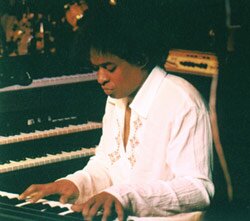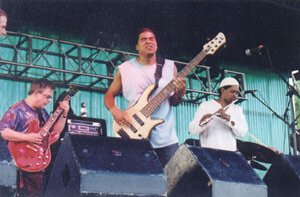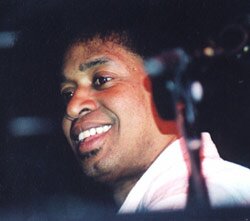 Kofi Burbridge has radically changed the sound of the Derek Trucks Band since joining the group five years ago. Until now, he's been known for who he's connected to-he's 'Oteil's brother' or 'Derek's keyboard player' to most people. But there's way more to Kofi. The man with the 'fro is about as multitalented as they come, and the ideas are still pouring out of him after more than two decades in the music business. Kofi Burbridge has radically changed the sound of the Derek Trucks Band since joining the group five years ago. Until now, he's been known for who he's connected to-he's 'Oteil's brother' or 'Derek's keyboard player' to most people. But there's way more to Kofi. The man with the 'fro is about as multitalented as they come, and the ideas are still pouring out of him after more than two decades in the music business.
Seventeen years ago, Kofi Burbridge moved to Atlanta to record an album. He's still waiting to finish it, but he hasn't exactly been sitting around. Kofi is that rarest of musicians - the combination virtuoso keyboard player/flautist. If he hasn't always known where he was headed, the path is his own, and he has traveled it his way.
The journey started in the Bronx, NY, where Kofi was born on September 22, 1961 to William and Carol Burbridge. They moved to Washington, DC two years later, and Oteil Burbridge was born there in 1964. Sisters Leilani and Adero followed in 1968 and 1971.
The boys made their musical talents obvious from an early age - Kofi's perfect pitch was discovered when he was six, and he began taking flute lessons. Meanwhile, Oteil held down the bottom end.
"He was 3, 4 years old, he was pulling off some funk rhythms," says Kofi. Before Oteil graduated to a standard drum set, his instrument of choice was a Quaker Oats box. The musical talent wasn't inherited - Kofi calls their father "one of those cats with no rhythm" - but the brothers did pick up on William's love of music.
"He is probably the absolute connoisseur," Kofi says. "The only other person I would put in the running with how much music he knows is Derek Trucks. Derek is relentless in his pursuit of the history. No one knows it all, but this cat is so concretely focused on it, he really loves it, he just loves it, and Dad is the same way."
Long before they were anchoring the jam scene, the Burbridges were musical partners in that house. They ran through enough instruments to be their own orchestra.
"Oteil and I had been shuffling instruments back and forth," Kofi says. "It was drums and flute, then bass and keyboards, and every once in a while we'd go through our orchestral thing. He's played bass clarinet, he's played violin, he's played trumpet. I've never played reeds, but we've both played piano, this, that - we really owe it to our parents." The Burbridges' talents extend outside the musical realm. Oteil was the host of a local television show, and Kofi worked the stage. When he was about 11, he spent a few months as the understudy for the role of Travis in A Raisin in the Sun. Later he traveled to Russia, seeing Moscow and Leningrad with fellow thespians.
When Kofi was in tenth grade, he took the first major step toward a career in music: he left home to attend the North Carolina School of the Arts in Winston-Salem. His focus was classical flute, but that wasn't enough. During his five years at the NCSA, Kofi's fellow students convinced the school to start a jazz program. At the same time, he got serious about his piano playing.
"That's when I heard No Mystery by Chick Corea and Return to Forever," he says. "I had never heard an acoustical group play like they did. I knew music could sound like that, I'd just never heard it." The same year, Kofi wrote the song that would become "Kam-ma-Lay." Derek Trucks hadn't been born yet, and Kofi's gig with the band was more than two decades off.
Kofi spent the years after music school gigging around the coastal Southeast with a variety of different bands, playing with musicians who were decades older. In 1987, he was invited to join a band in Atlanta. Excited about the possibility of recording in one of the city's studios, he'd wanted to go there since he was a student in NCSA. Oteil moved there soon after. The first band he joined in the area was called Knee-Deep, and the lineup included Oteil on bass and Jeff Sipe on drums. But it was too good to be true.
"It really was a strong group," Kofi remembers, but they were "playing the wrong music." They were sticking to Top 40-style pop, and the music was unfulfilling. The band broke up after less than a year. But it was through Knee-Deep that the Burbridges were drawn into the circle of Bruce Hampton and the unique group of musicians based in Atlanta. "I think it was 1989 where Jeff had turned Bruce and Oteil onto each other," he says. "I wasn't a part of that because I think at the time they were going for a guitar band, so it kept me in the local jazz thing."
Kofi still loved jazz, but he also spent time playing R&B. As a member of band called After Seven (which included Yonrico Scott on drums), he found himself opening for huge names like Whitney Houston and, in 1990, one of the biggest stars in the world - MC Hammer. The craziness was far beyond anything Kofi had experienced before. It was a world of stadium gigs, plane travel, and huge entourages, and though Kofi has only kind words about the Hammer himself, it wasn't his world.
But a few years later, there would be a homecoming of sorts: Kofi joined Aquarium Rescue Unit shortly after Col. Bruce Hampton left it, reuniting him with Oteil and Jeff Sipe. The band allowed him to stretch out musically, and to play the flute more than he had in many of the more commercial acts. After the ARU dissolved, though, things got dark. "I was in a band that was going nowhere," by 1999, he remembers. "It was one of those rock-bottom times in your life. I went outside myself and said, 'Lord, I want to play some real music!' Within a few days, Blake [Budney, the dTb's manager] called."
Bill McKay had left the band, and they needed a new keyboard player. Kofi had been around some of the band members in Atlanta for a decade, so the move made perfect sense.
"It was just so easy, I knew I could live with them, I knew I could be on the bus with them, I knew it would be cool, so I said 'Man, this is it.'"
He'd finally found his place after decades of searching. This was much more than a marriage of convenience, though: Kofi and Derek Trucks are well-matched as musicians. Both are explorers, driven to find music that touches them, always experimenting.
That experiment is still ongoing - the musicians are continuing to feel each other out and test their limits, and Kofi says he is still learning the B-3 organ. The songs he has contributed to the band so far illustrate the breadth of his abilities: the Latin jazz of "Kam-ma-Lay," the neo-Motown "Like Anyone Else," the haunting beauty of "So Close, So Far Away," and the wild fusion track, "Lookout 31."
"My hat's off, really, to the band for even attempting something like this," he says of the dTb's diverse repertoire. "You know how critical people can be about a band that tries everything. By no means is it perfection, we're always trying to get better, but there's always something new that we're trying."
There's a lot more to come. As the dTb works on a new album, Kofi is still working on that solo album, laying down tracks when he finds the time. He plans to make it a unique, multi-media effort. And he says he wants to start singing for the band as well. It's about being daring and trying something unusual, going as far as the imagination will allow. There is only one constant: Kofi and his music will never be like anyone else.

|
















